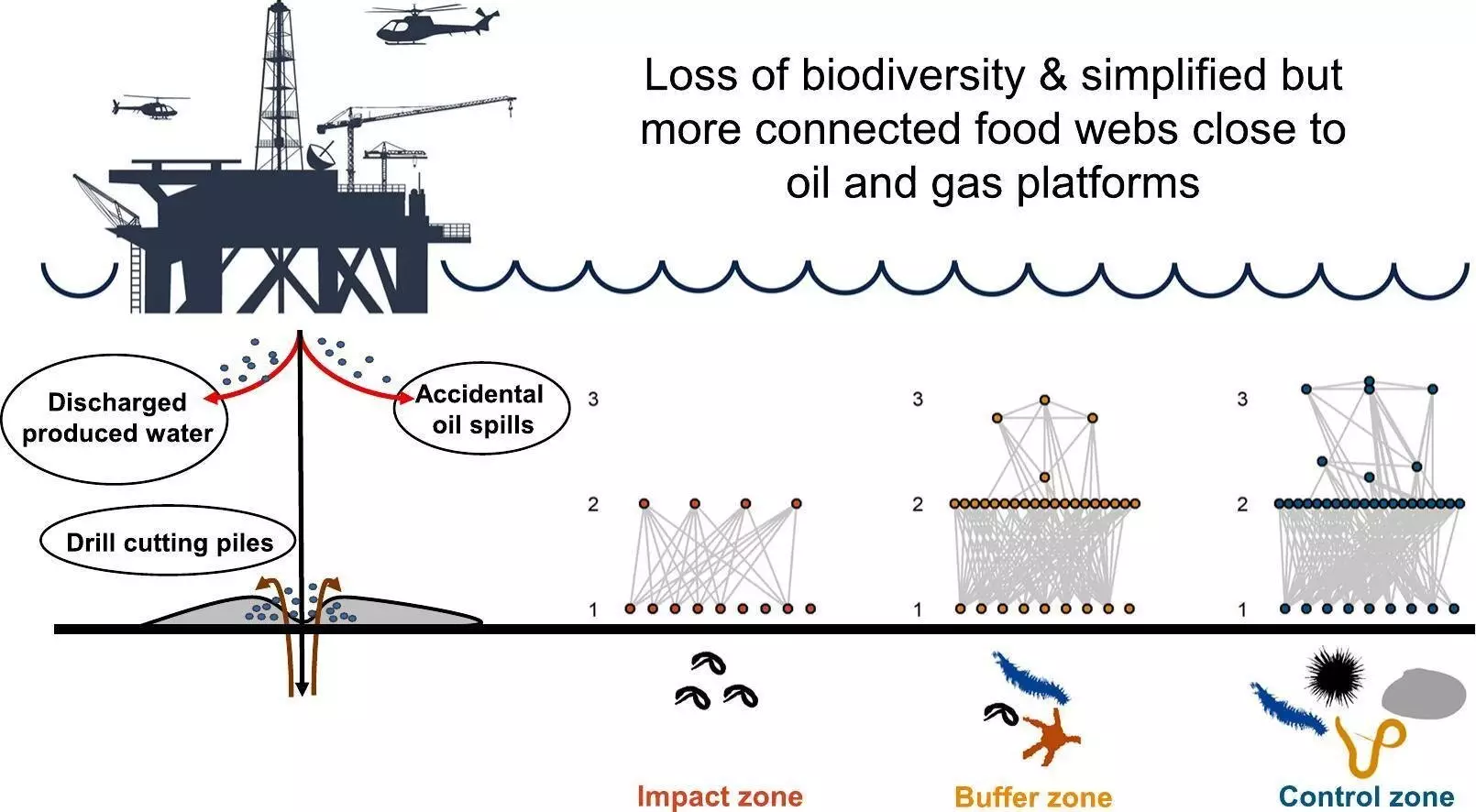A recent study reveals a startling impact of oil and gas extraction on the North Sea’s marine ecosystem, highlighting an alarming spike in pollution levels that can exceed 10,000% within close proximity to offshore platforms. Conducted by a team from the University of Essex, the Natural History Museum, and the Center for Environment, Fisheries and Aquaculture Science (CEFAS), their findings—published in Science of The Total Environment—paint a grim picture of biodiversity loss around Britain’s oil platforms, demonstrating a concerning trend in the ongoing exploration of fossil fuels around the globe.
The research focused on the harmful effects of pollutants such as hydrocarbons, which were shown to be up to 10,613% higher within a mere half a kilometer from operational platforms. Heavy metals including lead, copper, and nickel were similarly elevated, with concentrations rising by 455% in the same vicinity. The persistent accumulation of these contaminants over decades has evidently begun to erode the foundation of marine invertebrate life, which serves as a linchpin in the ocean’s food web.
The Biodiversity Crisis: Insights from Historical Data
Data analyzed in this comprehensive study spanned nearly three decades, drawing from biological samples of 4,216 species collected from 1981 to 2012 at nine sites located off the coasts of Scotland and England. The results overwhelmingly indicate a decline in both species richness and population numbers as one approaches the contamination sources. Specifically, researchers noted a plummet in species diversity—down by 28%—and a significant simplification of food webs near the platforms.
The implications for marine ecosystems are deeply troubling. Larger predators, including starfish, appear especially vulnerable to pollution’s deleterious effects, while smaller organisms, such as worms, have adapted to flourish in these tainted sediments. This shift not only alters the biodiversity landscape but also raises concerns about the overall health of the ocean environment. Increasing simplicity in food webs, characterized by fewer connections and species, renders these ecosystems increasingly fragile and less productive.
The Role of Research: Uncovering Biodiversity Changes
Leading this groundbreaking investigation was Zelin Chen, a Ph.D. candidate at the University of Essex, whose meticulous approach involved examining chemical data to delineate clear zones of impact around the platforms. By categorizing areas into zones of direct impact (0-500 meters), semi-impacted (500-1500 meters), and unimpacted (beyond 1500 meters), Chen was able to illustrate stark contrasts in biodiversity and food web complexity.
The findings underscore a critical reality: offshore oil and gas operations are not just industry practices, but forces that can fundamentally reshape ecosystems. Chen remarks on the unprecedented clarity of trends observed across multiple platforms, reinforcing a widely acknowledged but previously unquantified hypothesis about the ecological costs of hydrocarbon extraction.
Collaborative Thought: Urging Industry and Government Action
Dr. Eoin O’Gorman from the University of Essex emphasizes the dire ramifications of these findings, stating that simpler food webs reflect lower productivity levels and heightened environmental stress. As many of the oil and gas platforms approach decommissioning, the urgency for responsible action becomes glaringly apparent. There is a collective sentiment among scientists involved that the legacy of these operations must be addressed with vigilance.
Dr. Natalie Hicks, another collaborator in the research, cautions that a science-led approach is imperative for decommissioning practices. With the potential for further ecological degradation in future endeavors, cooperation between the industry and government is critical to develop strategies that safeguard marine ecosystems. The ocean delivers vital services, including climate regulation, making its preservation paramount for future generations.
The Bigger Picture: Protecting Marine Life Amidst Oil Riches
Amid the allure of oil riches, the trade-offs remain stark and profound. The extraction processes not only devastate the immediate marine life surrounding the platforms but also establish a concerning precedent for future fossil fuel exploration. As climate change concerns escalate and the world shifts toward sustainable energy, understanding the extent of damage caused by traditional energy sectors is vital in reimagining our relationship with natural resources.
Dr. Gareth Thomas, a scientist at the Natural History Museum, sums up the broader implications of this research. The collaboration spanning thirty years of field data not only emphasizes the detrimental impact of oil and gas operations on marine biodiversity but also positions these findings as a clarion call for more sustainable practices worldwide. The unfolding narrative calls for a concerted effort to realign our energy pursuits with the health and integrity of our oceans—an endeavor that is both necessary and urgent.

